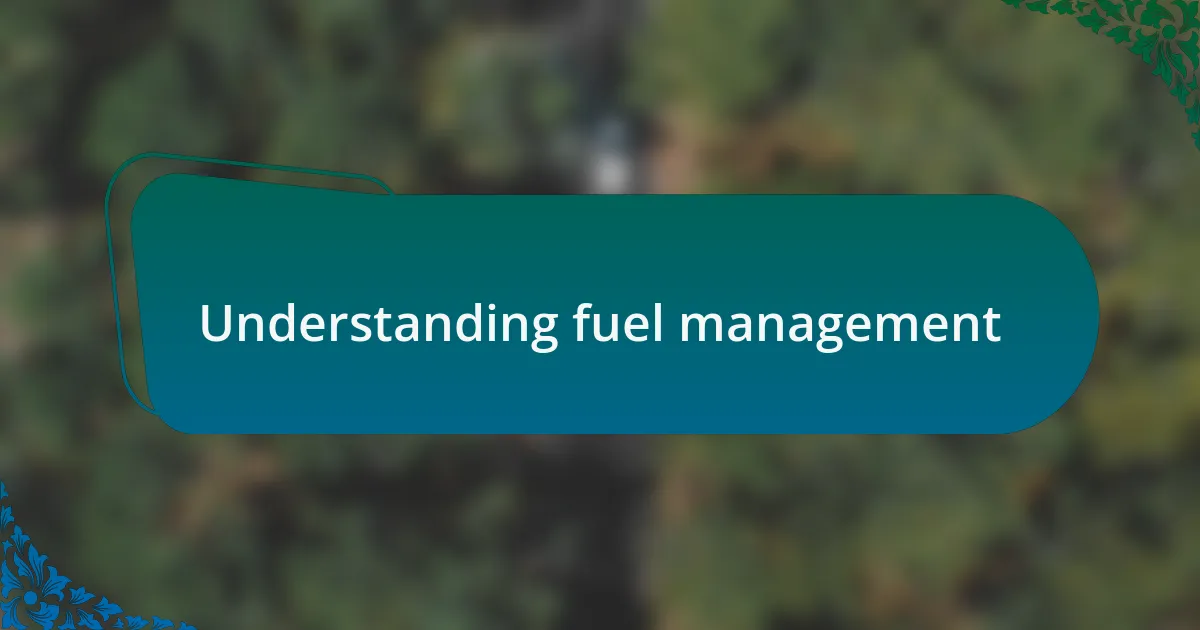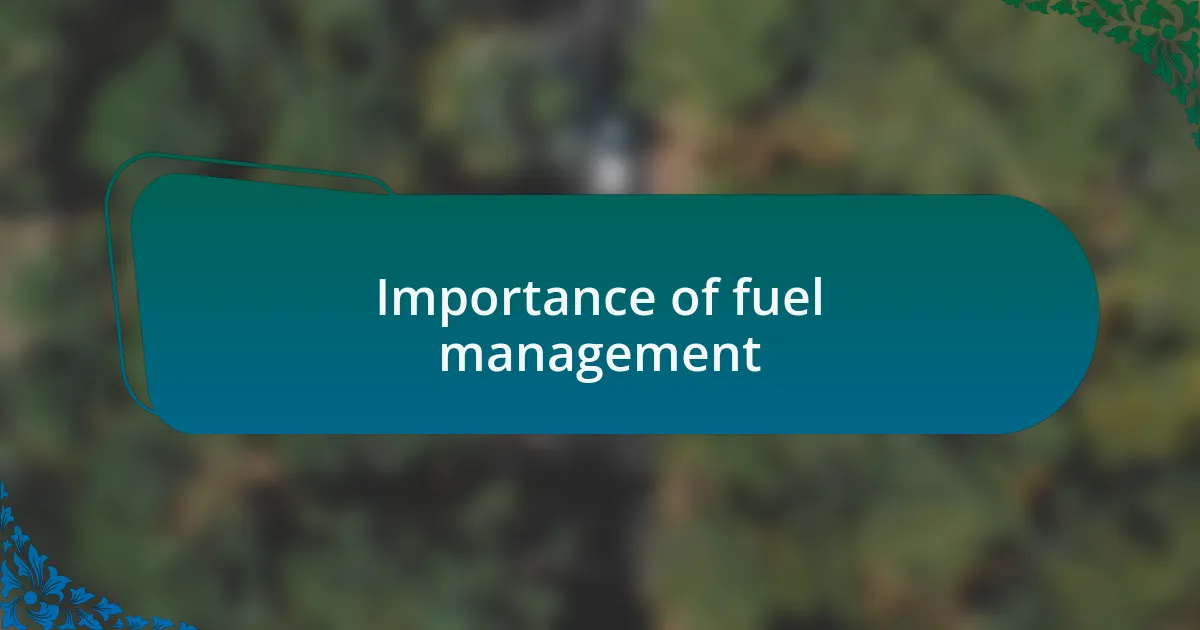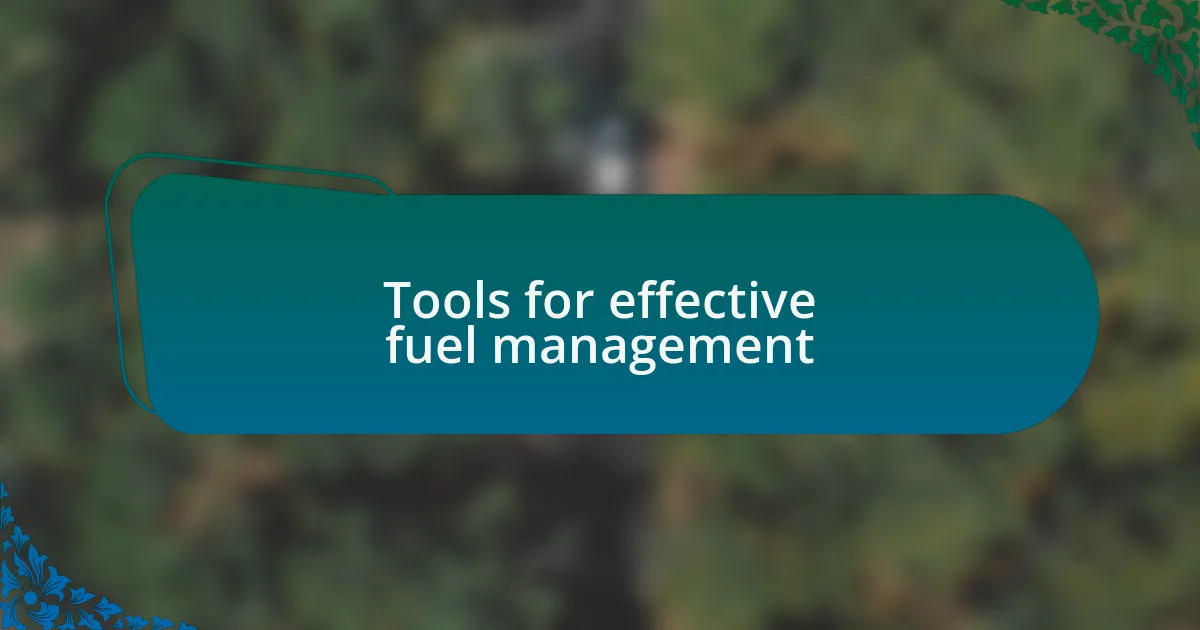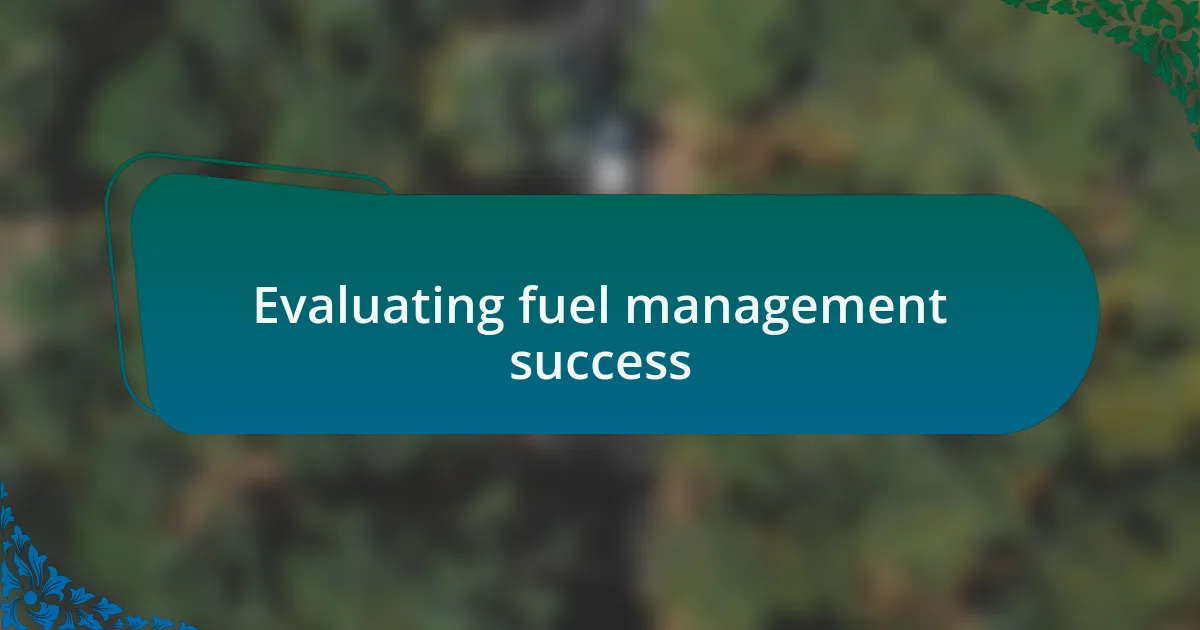Key takeaways:
- Effective fuel management encompasses the entire lifecycle of fuel, from consumption to distribution, and leverages technology for real-time insights.
- Implementing training for drivers on fuel-efficient practices and regular fuel audits can significantly reduce costs and improve vehicle longevity.
- Challenges such as fuel theft and unpredictable prices require proactive strategies and robust inventory management for effective fuel management.
- Measuring success through key performance indicators and team feedback is crucial for identifying areas of improvement and celebrating progress.

Understanding fuel management
Fuel management is more than just tracking how much gasoline or diesel a vehicle uses; it’s about understanding the entire lifecycle of fuel consumption, including storage, distribution, and usage patterns. I recall a time when our team noticed a significant spike in fuel costs. What we found was not just an increase in prices but a misuse of fuel due to improper tracking, leading to waste. Have you ever wondered how much a small leak or an inefficient fuel pump can affect your bottom line?
To really grasp fuel management, it’s essential to consider how technology can help. For instance, I’ve found that implementing fuel management software transformed our operations. It provided real-time data on fuel consumption, which allowed us to make informed decisions. This type of insight can lead to immediate improvements – like identifying vehicles that are consuming more fuel than they should. Have you ever thought about how a simple adjustment could significantly enhance efficiency?
Moreover, emotions play a pivotal role in fuel management. It’s about the peace of mind that comes from knowing you’re maximally efficient and not squandering resources. When I see our numbers improve after making strategic changes, it’s incredibly fulfilling. It reinforces my belief that proper fuel management isn’t just a financial strategy; it’s a commitment to sustainable and responsible practices. What feelings does effective fuel management evoke for you?

Importance of fuel management
Fuel management is crucial for any operation relying on vehicles, as it directly impacts cost efficiency and operational performance. I remember a time when we streamlined our fuel processes, which not only reduced expenses but also minimized the carbon footprint of our fleet. Have you considered how every drop of fuel saved contributes to both your budget and the planet?
Efficient fuel management can also enhance vehicle longevity. I’ve often noticed that vehicles operating with well-maintained fuel systems tend to perform better and last longer. This realization sparked a shift in our approach; it became clear that investing in fuel management wasn’t just about immediate savings, but also about preserving our investments long-term. How might your vehicle’s lifespan improve with better fuel management practices?
In my experience, a robust fuel management system fosters accountability within the team. For instance, after we implemented regular training sessions on fuel best practices, I saw a remarkable shift in awareness and responsibility among drivers. It’s genuinely uplifting to witness a collective effort towards more mindful fuel usage. What changes might you observe within your team if everyone embraced the importance of fuel management?

Fuel management best practices
Implementing regular fuel audits can be a game-changer in managing fuel effectively. I recall when we conducted our first audit; the results were eye-opening. We discovered discrepancies that led to unnecessary expenses, and addressing them not only streamlined our spending but also fostered a culture of transparency within the team. Have you ever thought about what you might uncover through a simple audit?
Another best practice is investing in training for drivers on fuel-efficient driving techniques. From my experience, educating drivers about habits like smooth acceleration and braking can substantially reduce fuel consumption. When we introduced these training sessions, I was amazed at how quickly our fuel expenses began to decline. It makes you wonder how the little changes in daily driving could yield significant savings, doesn’t it?
Finally, utilizing technology to monitor fuel usage in real time can profoundly enhance management practices. I remember when we implemented a telematics system, which provided insights into fuel consumption patterns, allowing us to make data-driven decisions. Seeing the immediate impact on our fuel costs was incredibly rewarding. Have you considered how technology could revolutionize your approach to fuel management?

Common fuel management challenges
Fuel management often presents a myriad of challenges that can trip up even the most seasoned operators. One significant hurdle I’ve encountered is managing fuel theft or loss. I remember a time when discrepancies in our fuel inventory sparked a comprehensive investigation. It turned out some of our fuel was siphoned off during refueling. This experience underscored the necessity of stringent security measures. Have you taken steps to protect your fuel supply?
Another common challenge is accurately forecasting fuel needs. In my early days, I often found myself scrambling for fuel during unexpected spikes in demand. After experiencing a few stressful situations where vehicles ran low on fuel, I learned the importance of maintaining a responsive inventory management system. Effective forecasting not only ensures consistency but also prevents the financial strain of last-minute fuel purchases. How often do you reassess your fleet’s fuel needs?
Finally, adapting to fluctuating fuel prices can feel like a roller coaster ride. There were moments when I felt overwhelmed by rising costs, impacting our budget significantly. I found that developing a robust price adjustment strategy helped mitigate the financial impact of sudden price changes. This proactive approach has been instrumental in maintaining balance in our operational budget. Have you considered the role of a flexible pricing strategy in your fuel management plan?

My personal fuel management strategy
Fuel management, for me, is all about staying proactive rather than reactive. One strategy I employ is establishing strong relationships with fuel suppliers. I remember negotiating a contract with one supplier that offered favorable terms. This not only provided us with price stability but also ensured prompt deliveries, which reduced our downtime significantly. Have you considered how a good partnership can impact your fuel management?
Another key element of my approach is harnessing technology to streamline operations. I rely on data analytics tools to monitor fuel usage patterns in real-time. This became especially beneficial when I discovered that certain vehicles were consuming more fuel than expected. By pinning down the cause, which turned out to be a maintenance issue, I was able to save costs and optimize our fleet’s performance. Have you tapped into technology to uncover efficiencies in your fuel management?
Lastly, I focus on educating my team about fuel conservation techniques. I recall organizing a workshop that highlighted driving behaviors that waste fuel, such as rapid acceleration and excessive idling. The enthusiasm and engagement from my team were heartwarming, and I noticed a marked improvement in our fuel efficiency afterward. It made me realize that instilling a culture of awareness can have profound effects. How involved is your team in achieving your fuel management goals?

Tools for effective fuel management
When it comes to tools for effective fuel management, I can’t emphasize enough the importance of tracking software. I’ve used systems that provide dashboard visuals of our fuel consumption metrics. It felt incredible to see the data laid out so clearly; it allowed me to identify not just trends but anomalies that needed immediate attention. Have you ever used a tool like this to get a clear snapshot of your fuel efficiency?
In my experience, fuel cards offer an additional layer of control. They not only streamline the purchasing process but also provide comprehensive reports on fuel spending across the fleet. I remember one instance where we adjusted our fueling strategy based on the insights gained from these reports. It was almost like uncovering a hidden treasure; the information enabled us to reallocate resources more effectively. Do you know how much you can save with the right fuel card?
Lastly, I cannot overlook the advantage of having real-time GPS tracking systems in our vehicles. By integrating GPS, I’ve been able to optimize routes and reduce unnecessary mileage. I recall a time when we had a last-minute job across town, and thanks to our tracking system, we adjusted our route efficiently, saving both time and fuel. Have you considered how a solid GPS system can revolutionize your fuel management approach?

Evaluating fuel management success
To truly evaluate fuel management success, it’s essential to analyze key performance indicators (KPIs). I’ve often found that metrics like fuel efficiency ratios and cost per mile can reveal so much about where your operation stands. For instance, tracking these figures over time has shown me significant areas for improvement and even illuminated unexpected savings. How do you currently measure your efficiency?
I also believe in the power of team feedback when assessing success. After implementing new fuel-saving strategies, I initiated discussions with my team about their experiences. It was fascinating to hear their perspectives; they provided insights into on-the-ground challenges and opportunities I hadn’t considered. Have you tapped into the knowledge your team has about your fuel practices?
Finally, comparing historical fuel data to current consumption is a crucial step. In one of my previous roles, I compiled quarterly comparisons that revealed a dramatic drop in fuel use after adopting certain strategies. The excitement in the office was palpable as we celebrated tangible results. What patterns have you noticed in your fuel data?